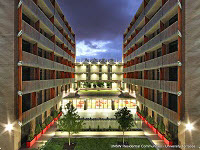Computational Design - 3268
Program Summary
Faculty: Built Environment
Contact: Built Environment
Campus: Sydney
Career: Undergraduate
Typical UOC Per Semester: 24
Min UOC Per Semester: 6
Max UOC Per Semester: 24
Min UOC For Award: 144
UAC Code: 423100
Domestic Entry Requirements: See Domestic Entry Requirements
International Entry Requirements: See International Entry Requirements
Award(s):
Bachelor of Computational Design
View program information for previous years
Program Description
Program Objectives and Graduate Attributes
Students collaborate interdiscipline within and outside of faculty to apply learned skills on practice-based projects. The degree offers all aspects of the utilisation of digital technologies to engage in the progress of the built environment.
Lectures and practical sessions comprising:
1. Computational Design Theory
2. Optimisation and Decision Support
3. Smart and Ubiquitous Cities
4. Responsive Environments
5. Digital Fabrication and Construction
6. Gaming and Visual Representation
7. BIM modelling
Program Structure
Students construct virtual and physical artefacts, objects and buildings using Gaming and Visual Representation and Digital Fabrication and Construction in courses.
Using digital technologies including sensors students create responsive environments and study the impact of technology on Smart and Ubiquitous Cities in the courses.
- CODE1210 Computational Design Theory 2 (6 UOC)
- CODE1230 Urban Modelling (6 UOC)
- CODE1231 Ubiquitous Cities (6 UOC)
- CODE1240 Real-Time Environments (6 UOC)
Students optimise design outcomes through computational support using software packages in the courses.
The courses CODE2250, CODE2230, CODE2270 are taught in intensive mode blocks of 5 weeks per course in a consecutive manner.
For recommended electives please refer to the table below.
- Open Elective (6 UOC)
Students will define their field of proficiency in one of the seven paths.
- Open Elective (6 UOC)
- BEIL course (6 UOC)
- General Education (6UOC)
- CODE3200 Graduation Project (12 UOC)
- BEIL Course (6 UOC)
- General Education (6 UOC)
A list of current Interdisciplinary Learning Courses is below:
- BEIL0017 Business Start Up (6 UOC)
- BEIL6000 Issues in Urbanism (6 UOC)
- BEIL6003 Cinematic Space (6 UOC)
- BEIL0001 Graphic Design for Built Env (6 UOC)
- BEIL0005 People, Place and Design (6 UOC)
- BEIL0007 Sustainable Design Thinking (6 UOC)
- BEIL0010 Creating Value for Built Env (6 UOC)
- BEIL0011 Healthy Planning (6 UOC)
- BEIL0013 Architectural Photography (6 UOC)
- BEIL0014 Digital Making (6 UOC)
- BEIL6002 Urban and Regional Design (6 UOC)
- BEIL6004 Classical Architecture (6 UOC)
- BEIL6005 Art, Architecture and Design (6 UOC)
- BEIL0001 Graphic Design for Built Env (6 UOC)
- BEIL0003 BE Annual Design Competition (6 UOC)
- BEIL0005 People, Place and Design (6 UOC)
- BEIL0006 BE OutThere Elective (6 UOC)
- BEIL0008 Vision to Reality (6 UOC)
- BEIL0009 Exhibition Design (6 UOC)
- BEIL0013 Architectural Photography (6 UOC)
- BEIL6001 International Planning (6 UOC)
- BEIL6006 Heritage Planning (6 UOC)
General Education Requirements
Honours
Pass with Distinction:
Students completing the 3-year Bachelor of Computational Design program, may graduate with Distinction if they achieve an overall WAM of 75.
Students completing their Bachelor of Architectural Computing in 2014 can enrol into Honours in Architectural Computing in 2015.
Honours in Computational Design 4523 will be offered from 2016.
Academic Rules
To fulfil these requirements, students must complete:
The standard duration of the program is 3 years consisting of 6 semesters of full-time study (24 units of credit per semester). Students taking less than the standard full-time load will be extending the duration their program and will need to note that many courses are only offered in one of the two main semesters.
Students must complete all courses in each of the first four semesters in sequence prior to enrolment in Semesters 5 and 6.
Students are not able to enrol in two design studios concurrently.
Students must have passed all classes in semester 1 – 4 prior to commencing the final year.
- 108 units of core courses, being all those prescribed in the in the faculty regulations for this program.
- 12 units of FBE Electives – from the list of Built Environment Interdisciplinary Learning Courses outlined in (see list above).
- 12 units of open (free) electives, selected in accordance with the faculty regulations for undergraduate study in the Faculty of the Built Environment (see below)
- 12 units of General Education in accordance with University requirements (see above).
Fees
Computer Equipment
For details regarding hardware and or software applications, please contact the Faculty.









